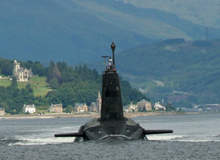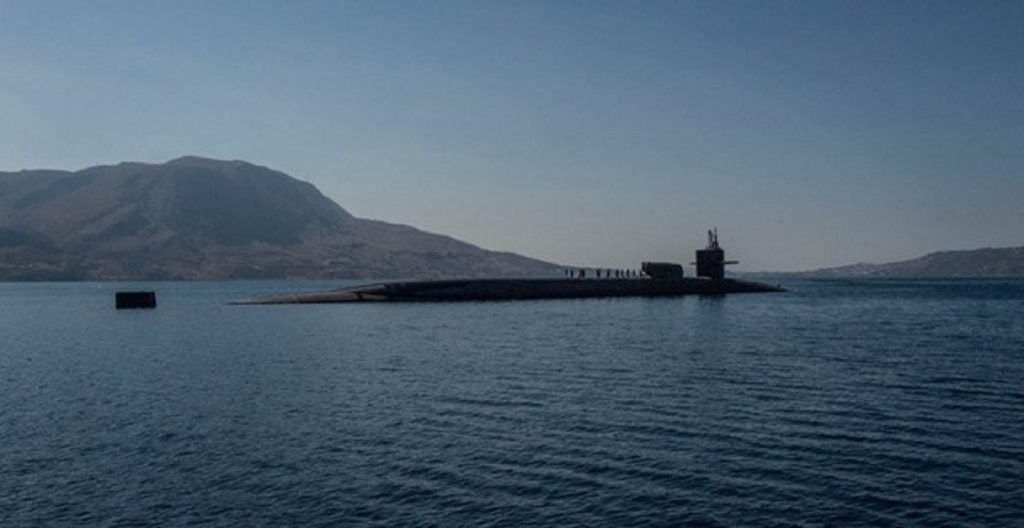
The announcement that Britain intends to reduce its nuclear deterrent capability by one submarine comes at a time when great pressure is being put on the government to reduce public spending. It also comes at a time when Britain is being asked to demonstrate a clear determination to reduce nuclear stocks globally, not least to persuade Iran not to embark upon the nuclear road.
With three remaining Vanguard nuclear submarines, of which one will be home based for essential maintenance, the future of the independent deterrent would appear to be in doubt. A new non-proliferation treaty appears to be in the offing. And with system replacement costs estimated at up to £20bn, there will be many from all three services that will be making persuasive claims that the deterrent is no longer affordable and is in any case, of dubious relevance to ‘wars among the people’ such as those in Iraq and Afghanistan. As in previous decades, there will be further debate as to the merits of a deterrent other than a submarine-based one. And with an in-service date of 2025, the procurement clock is already ticking.
The ethical and pragmatic case against continued possession of an independent deterrent is compelling and perhaps best articulated by (retired) General Sir Hugh Beach. In his ‘White Elephant or Black Hole’ RUSI journal of February 2009, he points out that 188 states are party to the Nuclear Non-Proliferation Treaty (NPT) and seem none the worse for having opted out of the nuclear arena. He also makes the entirely valid point that most conflicts in recent years have been of a conventional or asymmetric variety, where nuclear weapons played no part. He further reminds us that the missiles are in any case from a shared pool provided by the US under the Mutual Defence Agreement of 1958, an arrangement recently extended to 2014. His demolition of the case for using the deterrent in the context of an Al Qaida terrorist threat is also convincing.
The importance of independence
UK Shadow Defence Minister Julian Lewis and the late defence strategist Sir Michael Quinlan have made an equally powerful claim that the UK can and must continue its deterrent capability. Lewis points to the notion that the era of high-intensity state-on-state warfare is gone for good is a ‘dangerous fallacy’ and equally important and he reminds us that our capacity to predict future conflict is woefully inadequate, this despite well over a century of political pseudo-science with its claims to the contrary. His reference to advice offered by former chiefs of staff in 1964 that in the event that a government decided to abandon Britain’s independent deterrent, that they should be absolved from further responsibility for the defence of the UK, is chillingly prescient.
See Also:
Most of the reasoning for a requirement to change the current position over nuclear deterrence is spurious. Claims that ‘globalisation’ or ‘the end of the Cold War’ have led to a situation of rebus sic stantibus are simply flawed. Nothing has fundamentally changed since the1962 Nassau Agreement. The UK needed then, and still needs now, the degree of independent political action that will ensure its retention as a close ally of the USA as well as its place on the UN Security Council. The cost of so doing may well have been high, such as siding with the US over the invasion of Iraq in 2003 in the face of overwhelming public outcry and now remaining alongside the US in Afghanistan. The price in blood and treasure may indeed be seen as unacceptable but it is there, nevertheless.
How well do you really know your competitors?
Access the most comprehensive Company Profiles on the market, powered by GlobalData. Save hours of research. Gain competitive edge.

Thank you!
Your download email will arrive shortly
Not ready to buy yet? Download a free sample
We are confident about the unique quality of our Company Profiles. However, we want you to make the most beneficial decision for your business, so we offer a free sample that you can download by submitting the below form
By GlobalDataReductions in the size of the deterrent system may well become a reality, as proposed in the 20% reduction in missiles in the 2006 defence white paper. Politicians are also entitled to uphold the moral high ground of an aspiration for a nuclear-free world, entirely laudible yet hopelessly unrealistic as this might be for as long as countries such as North Korea are engaged in obtaining a nuclear capability.
Possession of an independent nuclear deterrent has been universally welcomed over generations and possession of a fleet of Vanguard submarine replacements will guarantee jobs at Barrow-in-Furness for many years to come, especially once the Astute fleet has been built.
UK continuous at-sea deterrent
Could the UK seriously contemplate a future as a maritime power without submarine capabilities of reach, stealth, endurance on station and the capacity for either nuclear or conventional strike at any point on the globe as our continuous at-sea deterrence (CASD)? This was, after all, one of the key arguments of 1962. The world was then a dangerous place, as was witnessed by the Cuban missiles crisis of that year. And who in government would contemplate a reversion to unilateralism,
guaranteed to bring political isolation for decades to come?
Whilst agreeing with Hugh Beach that the ‘logic’ of possession is difficult if not impossible to sustain, perception is all in international politics and chance an uncertainty are its bedrock. Or as Clausewitz would say in his book On War ‘The difficulties accumulate and end by producing a kind of friction that is inconceivable unless one has experienced war’.







